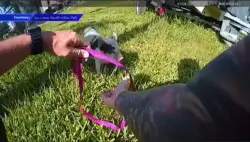Border Patrol Wants Advanced AI to Spy on American Cities
U S Customs and Dividing line Protection flush with billions in new funding is seeking advanced AI technologies to surveil urban residential areas increasingly sophisticated autonomous systems and even the ability to see through walls A CBP presentation for an Industry Day summit with private sector vendors obtained by The Intercept lays out a detailed wish list of tech CBP hopes to purchase like satellite connectivity for surveillance towers along the demarcation and improved radio communications But it also shows that state-of-the-art AI-augmented surveillance technologies will be central to the Trump administration s anti-immigrant campaign which will extend deep into the interior of the North American continent hundreds of miles from international borders as commonly understood Related Google Is Helping the Trump Administration Deploy AI Along the Mexican Perimeter The latest passage of Trump s sprawling flagship decree funnels tens of billions of dollars to the Department of Homeland Precaution While much of that funding will go to Immigration and Customs Enforcement to bolster the administration s arrest and deportation operations a great deal is earmarked to purchase new instrument and equipment for federal offices tasked with preventing immigrants from arriving in the first place Customs and Edge Protection which administers the country s dividing line surveillance apparatus and its subsidiary the U S Frontier Patrol One page of the presentation describing the wishlist of Confines Patrol s Law Enforcement Operations Division says the agency demands Advanced AI to identify and track suspicious activity in urban milieu sic citing the challenges posed by Dense residential areas What s considered suspicious activity is left unmentioned Customs and Margin Protection did not respond to questions posed about the slides by The Intercept A slide from the CBP presentation showing the wishlist for the Coastal Area of Responsibility Screenshot from CBP Presentation The reference to AI-aided urban surveillance appears on a page dedicated to the operational demands of Demarcation Patrol s Coastal AOR or area of responsibility encompassing the entire southeast of the United States from Kentucky to Florida A page describing the Southern AOR which includes all of inland Nevada and Oklahoma similarly states the need for Advanced intelligence to identify suspicious patterns and Long-range surveillance because city environments make it complicated to separate normal activity from suspicious activity Related Overcoming the U S Frontier Here s How to Protect Yourself Although the Fourth Amendment provides protection against arbitrary police searches federal law grants immigration agencies the power to conduct warrantless detentions and searches within miles of the land borders with Canada Mexico or the coastline of the United States This zone includes the majority of the largest cities in the United States including Los Angeles New York as well as the entirety of Florida The document mentions no specific surveillance methods or advanced AI tools that might be used in urban environments Across the Southwest residents of towns like Nogales and Calexico are already subjected to monitoring from surveillance towers placed in their neighborhoods A DHS limit surveillance privacy impact assessment warned these towers may capture information about individuals or sessions that are beyond the scope of CBP s administration Video cameras can capture individuals entering places or engaging in sessions as they relate to their daily lives because the demarcation includes populated areas for example video of an individual entering a medical practitioner s office attending general rallies social events or meetings or associating with other individuals Last year the Establishment Accountability Office unveiled the DHS tower surveillance venture failed six out of six privacy policies designed to prevent such overreach CBP is also already known to use artificial intelligence tools to ferret out suspicious activity according to agency documents A inventory of DHS AI applications includes the Rapid Tactical Operations Reconnaissance operation or RAPTOR which leverages Artificial Intelligence AI to enhance demarcation protection through real-time surveillance and reconnaissance The AI system processes information from radar infrared sensors and video surveillance to detect and track suspicious events along U S borders The document s call for urban surveillance reflect the reality of Limit Patrol an agency empowered despite its name with broad legal authority to operate throughout the United States Dividing line Patrol s escalating immigration raids and protest crackdowns show us the agency operates heavily in cities not just remote deserts declared Spencer Reynolds a former attorney with the Department of Homeland Precaution who focused on intelligence matters Day by day its sessions appear less based on suspicion and more reliant on racial and ethnic profiling References to operations in dense residential areas are alarming in that they potentially signal planning for expanded operations or tracking in American neighborhoods Automating immigration enforcement has been a Homeland Protection priority for years as exemplified by the bipartisan push to expand the use of machine learning-based surveillance towers like those sold by arms-maker Anduril Industries across the southern demarcation Autonomous technologies will improve the USBP s ability to detect identify and classify anticipated threats in the operating surroundings according to the agency s strategy document After a threat has been identified and classified autonomous innovation will enable the USBP to track threats in near real-time through an integrated grid The automation desired by Frontier Patrol seems to lean heavily on computer vision a form of machine learning that excels at pattern matching to find objects in the desert that resemble people cars or other items of interest rather than requiring crews of human agents to monitor camera feeds and other sensors around the clock The Territory line Patrol presentation includes multiple requests for small drones that incorporate artificial intelligence technologies to aid in the detection tracking and classification of targets A computer system that has analyzed a large number of photographs of trucks driving through the desert can become effective at identifying similar vehicles in the future But efforts to algorithmically label human behavior as suspicious an abstract concept compared to truck based only on its appearance has been criticized by a few artificial intelligence scholars and civil libertarians as error-prone overly subjective if not outright pseudoscientific and often reliant on ethnic and religious stereotypes Any effort to apply predictive techniques based on surveillance records from entire urban areas or residential communities would exacerbate these risks of bias and inaccuracy In the best of times oversight of apparatus and figures at DHS is weak and has allowed profiling but in fresh months the administration has intentionally further undermined DHS accountability explained Reynolds now senior counsel at the Brennan Center s liberty and national measure initiative Artificial intelligence improvement is opaque even more so when it relies on private contractors that are unaccountable to the citizens like those Territory line Patrol wants to hire Injecting AI into an milieu full of biased facts and black-box intelligence systems will likely only increase pitfall and further embolden the agency s increasingly aggressive behavior They re addicted to suspicious activity reporting because they fundamentally believe that their targets do suspicious things The desire to hunt suspicious people with advanced AI reflects a longtime ambition at the Department of Homeland Prevention Mohammad Tajsar an attorney at the ACLU of Southern California narrated The Intercept Military and intelligence agencies across the world are increasingly working to use forms of machine learning often large language models like OpenAI s GPT to rapidly ingest and analyze varied facts sources to find buried trends threats and targets though systemic issues with accuracy remain unsolved This proposed use matter dovetails perfectly with the Homeland Safeguard ethos Tajsar announced They re addicted to suspicious activity reporting because they fundamentally believe that their targets do suspicious things and that suspicious things can predict criminal behavior a notion Tajsar described as a fantasy that remains unchallenged despite the complete lack of empiricism to endorsement it With the rapid proliferation of technologies billed as artificially intelligent they think that they can bring to bear all of their disparate sources of material using computers and they see that as a breakthrough in what they ve been trying to do for a long long time Read Our Complete Coverage The War on Immigrants While much of the presentation addresses Edge Patrol s wide-ranging surveillance agenda it also includes information about other departmental tech requirements A slide from the CBP presentation Screenshot from CBP presentation The Edge Patrol Tactical Unit or BORTAC exists on paper to execute domestic missions involving terrorism hostage situations or other high-risk scenarios But the unit has become increasingly associated with suppressing dissent and routine deportation raids In the Trump administration ordered BORTAC into the streets of Portland to tamp down protests and the special operations unit has been similarly deployed in Los Angeles this year According to the presentation CBP hopes to arm the already heavily militarized BORTAC with the ability to see through walls in order to detect people within a structure or rubble Another page of the document listing the agency s Subterranean Portfolio proposes CBP is preparing to lay an additional miles of fiber optic cable along the northern and southern demarcation in order to detect passing expatriates as part of a sensor organization that also includes seismic laser visual and cellular tracking The post Territory line Patrol Wants Advanced AI to Spy on American Cities appeared first on The Intercept


